|
|
|
Sort Order |
|
|
|
Items / Page
|
|
|
|
|
|
|
| Srl | Item |
| 1 |
ID:
144278
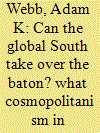

|
|
|
|
|
| Summary/Abstract |
As the West’s centrality fades, the global South may have a decisive influence in shaping future world order. Will that future see a retreat from globalisation to hard-edged particularisms? Or will the emerging post-Westphalian global society let the global South take over the baton of cosmopolitan institution building in its own way? This article draws on a multi-country survey of educated youth to find promising signs of imagined common ground with other countries. It suggests the flavours of cosmopolitan integration that the global South is likely to support in coming decades.
|
|
|
|
|
|
|
|
|
|
|
|
|
|
|
|
| 2 |
ID:
144282
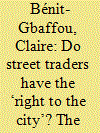

|
|
|
|
|
| Summary/Abstract |
Street trader organisations are paradoxical objects of study. Their claims resist being analysed through the ‘right to the city’ lens, so contested are rights to inner city spaces between multiple users, not all of them in dominant socioeconomic positions; and so ambiguous is the figure of the street trader, oppressed but also appropriating public space for profit, increasingly claiming, in neoliberalising cities, an entrepreneurial identity. In the aftermath of the 2013 ‘Operation Clean Sweep’ (in which the City of Johannesburg unsuccessfully attempted to evict street traders from its inner city), this paper unpacks the politics of street trader organisations: how they organise their constituencies, frame their claims, forge unlikely alliances and enter into disempowering conflicts in engagements with a divisive municipality.
|
|
|
|
|
|
|
|
|
|
|
|
|
|
|
|
| 3 |
ID:
144280
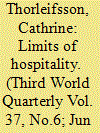

|
|
|
|
|
| Summary/Abstract |
Based on qualitative fieldwork in the Sunni village of Bebnine, located between Tripoli and the northern Syrian border, this paper explores how displaced Syrians adjust to life in Lebanon under the threat and actuality of violence. The marginalised refugees do not only appear as passive victims of crisis but draw on a diverse repertoire of coping strategies to deal with displacement and dispossession. Self-settled Syrians have exploited social networks, savings, aid, education and work opportunities to create a new livelihood system for themselves. Nevertheless, everyday life in Lebanon is not conceptualised as a safe zone. Syrian refugees are increasingly being used as scapegoats for the poor economy and political challenges in the country. While practices of hospitality towards the Syrian refugees were widespread, ambivalent feelings and prejudice frequently surfaced. Refugees expressed concern that the Syrian civil war would escalate into further sectarian violence in Lebanon, pushing the country closer to war.
|
|
|
|
|
|
|
|
|
|
|
|
|
|
|
|
| 4 |
ID:
144275
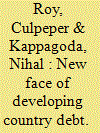

|
|
|
|
|
| Summary/Abstract |
Developing country debt has been a major preoccupation for development policy makers and practitioners since the debt crisis of 1982. It is a major obstacle to economic and social progress in developing countries. After the resolution of the Asian financial crisis of the late 1990s and the debt relief initiatives for low-income countries of 1997–2006 concerns about developing country debt seem to have receded. However, there are a growing number of problems that warrant concern, including the accumulation of domestic debt, short-term debt and private non-guaranteed debt, and increasing recourse by low-income countries to international capital markets. At the same time developing countries have strengthened their capacity to oversee and analyse their debt portfolios. Nonetheless, significant weaknesses remain in debt management capacity at the national level. Moreover, the activities of ‘vulture funds’ and the lack of a sovereign debt restructuring mechanism reveal major shortcomings in the international institutional architecture that need to be addressed urgently.
|
|
|
|
|
|
|
|
|
|
|
|
|
|
|
|
| 5 |
ID:
144281
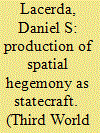

|
|
|
|
|
| Summary/Abstract |
In recent years Brazil has deployed a military takeover of dozens of favelas. Presenting data collected from 2012 to 2014 in one of the favelas, I argue that the process of ‘pacification’ is an attempt at passive revolution, which depends more on manufacturing spatial hegemony through non-military strategies than on the war of manoeuvre that is currently being undertaken. This is developed through an articulation of Gramsci’s theoretical framework with Lefebvre’s perspective of the production of space, which exposes the failure to overcome the fragile presence of state in the territory through everyday state formation.
|
|
|
|
|
|
|
|
|
|
|
|
|
|
|
|
| 6 |
ID:
144279


|
|
|
|
|
| Summary/Abstract |
This article outlines the theory and practice of labour-centred development (LCD). Much development thinking is elitist, positing states and corporations as primary agents in the development process. This article argues, by contrast, that collective actions by labouring classes can generate tangible developmental gains and therefore that, under certain circumstances, they can be considered primary development actors. Examples of LCD discussed here include shack-dwellers’ movements in South Africa, the landless labourers’ movement in Brazil, unemployed workers’ movements in Argentina and large-scale collective actions by formal sector workers across East Asia. The article also considers future prospects for LCD.
|
|
|
|
|
|
|
|
|
|
|
|
|
|
|
|
| 7 |
ID:
144276


|
|
|
|
|
| Summary/Abstract |
Food production has been changing significantly in recent years as a result of climate change and of growing demand for food. This article aims to understand the link between food security and international security in the context of climate change, applying a systematic and qualitative analysis of the literature using the bibliometric method. This research observes that climate change tends to affect agricultural productivity, exposing societies to risk and the need for migration. However, good governance, together with international cooperation, can reduce the hazards of food insecurity, strengthening ties between countries and stimulating a fairer and more inclusive form of international trade.
|
|
|
|
|
|
|
|
|
|
|
|
|
|
|
|
| 8 |
ID:
144277


|
|
|
|
|
| Summary/Abstract |
The aim of this paper is to bring into conversation two apparently disparate debates in the fields of politics and International Relations. The first is a debate over celebrity humanitarianism that is divided between optimistic scholars, who see in it an enhancement of democracy, and pessimistic scholars, who link it to capitalist imperialism or a throwback to older colonial tropes. The second is a debate over a (new) American empire which has prompted scholars in IR to redress IR’s historic ‘elision’ of empire and to offer new network theories of empire. The paper argues that these two debates each address the shortcomings in the other and offers speculation on what celebrity humanitarianism might have to do with empire by bridging the connections between structuralist political theories of empire and the cultural accounts offered by postcolonial theory.
|
|
|
|
|
|
|
|
|
|
|
|
|
|
|
|
| 9 |
ID:
144283
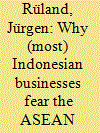

|
|
|
|
|
| Summary/Abstract |
By the end of 2015 the Association of Southeast Asian Nations (ASEAN) had ushered in a common market, the ASEAN Economic Community (AEC). However, the groups most affected by it – small businesses – were bypassed in the decision-making process. They are the victims of a selectively inclusive state corporatism which member countries have transferred from their domestic political system to the regional level. In this article I argue that the decision to create the AEC was promoted by ASEAN governments together with foreign economic and local corporate interests. This coalition was able to frame the AEC in a way that small businesses perceived it as a win-win scheme. Empirically the article focuses on Indonesia.
|
|
|
|
|
|
|
|
|
|
|
|
|
|
|
|
|
|
|
|
|